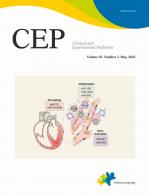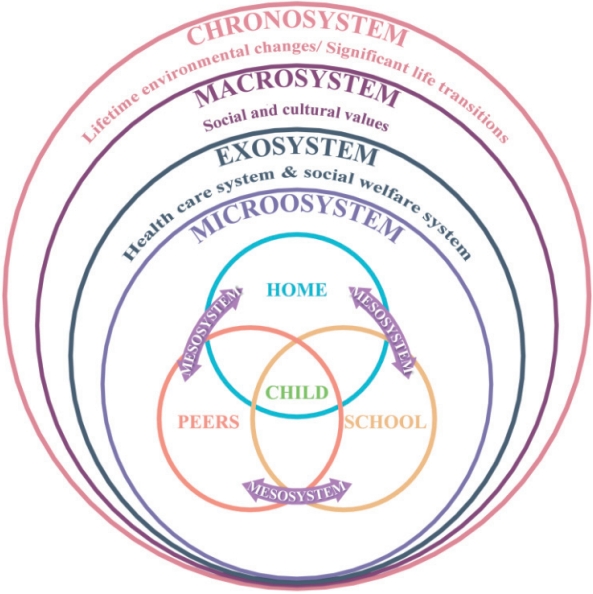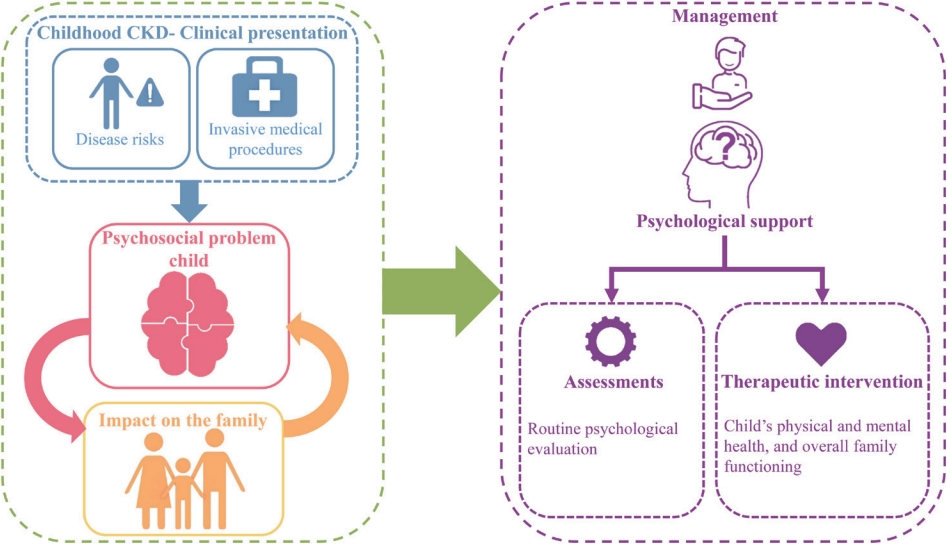Article Contents
| Clin Exp Pediatr > Volume 65(5); 2022 |
|
Abstract
Table 1.
| Study | Sample | Measures | Key findings |
|---|---|---|---|
| Children with CKD | |||
| Fukunishi and Honda [20] (1995) | 65 (35 kidney transplant and 30 CAPD); mean age: 9.9 years (transplant group), 9.7 years (CAPD) | Diagnostic interviews for children and adolescents | Academic problems and nonacademic problems (missing school, absenteeism from school events such as picnic, excursion, and relationship with peers) were highest in the CAPD group, followed by transplant children. |
| Fielding and Brownbridge [21] (1999) | 60; less than 22 years of age | Measure of the health status of the sick child, CDI, STAI-CH | Children who suffered more significant functional impairment due to their illness were likely to show more behavioral disturbance. |
| Madden et al. [22] (2003) | 16; 1.6–12.1 years | GMDS, WISC-III, SDQ | The majority of the children undergoing long-term peritoneal dialysis had IQ scores within the average to low average range. There were problems in the conduct, peer relationships, and hyperactivity domain. |
| Bakr et al. [23] (2007) | 38; 9–15 years | SCICA | The prevalence rate of psychiatric disorders in children with kidney failure was 52.6%. Adjustment disorders were more common. Anxiety and elimination disorders were reported. |
| Duquette et al. [24] (2007) | 30; 6–18 years. | WASI, WIAT-II | Children with CKD had more absenteeism and grade retention. Lower scores on IQ tests and math reasoning and word reading. Renal function was a significant predictor of academic scores. |
| Gerson et al. [25] (2010) | 402; 2–16 years. | PedsQL 4.0 | The health-related quality of life (HRQoL) was lower in children with CKD. They had significantly lower physical, school, emotional, and social domain scores. |
| Lande et al. [26] (2011) | 383; 6–17 years | WASI, WIAT-II-A, CPT-II, BRIEF | Children with CKD had poorer scores on visuospatial and planning tasks as well as overall scores on WASI. |
| Parents | |||
| Wiedebusch et al. [27] (2010) | 195 Parents of children suffering from the renal disease | IFS, SOEBEK, FKV, ULQIE | Parents of children undergoing dialysis experienced more limitations in the quality of life than children living with a kidney graft or undergoing conservative treatment. Mothers had lower HRQoL. The most frequent coping strategies used by parents were improving partnership, support, and focusing on the child. |
| Tong et al. [28] (2010) | Parent of 20 children with CKD | In-depth interviews | Parents had difficulty accepting the diagnosis and were traumatized watching their child undergo invasive medical procedures. They depended on health care providers for support and learned from other parents of CKD children. |
| Kili -Pstrusi ska et al. [29] (2014) | 388 Parent-proxies of children with CKD. | Questionnaire referring to changes in the family after diagnosing the child with CKD | The child’s illness changes the social connections of parents - they had fewer social interactions. Half the parents have never had any contact with the social workers. |
| Geense et al. [30] (2017) | 20 Families of children with CKD | Focus group interviews | Parents expressed the need to have reported needing more information on about their child's disease, medication-related information, and diet plan. They also needed information on how to balance work and life and practical support on child’s medical care, support in transport, financial management, and their child at school. |
| Nicholas [31] (2017) | 22 Fathers of children with CKD. | Semistructured interviews | Most fathers identified themselves as their child's coprimary caregiver, especially with giving medication, transport to and fro from the hospital. They felt a loss of personal control and emotional isolation. |
| Siblings | |||
| Batte et al. [32] (2005) | 15 Siblings of children undergoing chronic renal failure treatment. | SCAS | There were no indicators of clinically significant anxiety. However, siblings had concerns about their health worried about changes in the family routine, felt more protective towards their chronically ill siblings and needed to be more grown-up. |
| Velasco et al. [33] (2020) | 136 Siblings: 65 siblings of KT patients, 35 siblings of LT patients, 36 siblings of CRDs. | KIDSCREEN-52. | The healthy siblings of kidney transplant patients had a lower subjective perception of physical well-being and financial resources. |
| Agerskov et al. [34] (2020) | Siblings and parents of children with ESRD | Semistructured interviews. | The healthy siblings monitored, worried about, and felt for their sick sibling; they expressed annoyance when they could not share experiences. Siblings needed support when the ill child was hospitalized. |
| Parents: 7 | |||
| Siblings: 5 |
CKD, chronic kidney disease; CAPD, continuous ambulatory peritoneal dialysis; CDI, Children's Depression Inventory; STAI-CH, state-trait anxiety inventory for children; GMDS, Griffiths Mental Development Scales for children; WISC-III, Wechsler Intelligence Scale for children third edition; SDQ, strengths and difficulties questionnaire; IQ, intelligence quotient; SCICA, semistructured clinical interview for children and adolescents; WASI, Wechsler Abbreviated Scale of Intelligence; WIAT-II, Wechsler Individual Achievement Test—second edition; PedsQL 4.0, Pediatric Inventory of Quality of Life Core Scales; WIAT-II-A, Wechsler Individual Achievement Test-II-abbreviated; CPT-II, Conners' Continuous Performance Test-II; BRIEF, behavior rating inventory of executive functions; IFS, impact on family scale; SOEBEK, social orientations of parents of handicapped children questionnaire; FKV, freiburg questionnaire of coping with illness; ULQIE, Ulm Quality of Life Inventory for Parents; SCAS, Spence Children's Anxiety Scale; KT, kidney transplant; CRD, chronic renal disease; ESRD, end stage renal disease.
Table 2.
| Tools | Purpose/primary use | No. of items and administration time | Target population | Strengths and limitations |
|---|---|---|---|---|
| CBCL/6–18 YSR/11–18, and TRF/6–18) [40] | It measures internalizing behavior problems, externalizing behavior problems and social competence in children and adolescence based on the preceding 6 months. | 113 Behavioral items, scored as (0) not true, (1) somewhat true, (2) very true or often true. | CBCL/6–18 parents | Strengths: Multiple CBCL information can be collected on the same child. |
| 15 to 20 minutes | YSR/11–18 youths TRF/6–18 teachers familiar to the child | It is a reliable and valid measure used for both clinical interventions and research purposes. | ||
| Translated in other languages. | ||||
| Limitations: It takes a long time to fill the form. | ||||
| Scoring is complex. | ||||
| SDQ [41] | It screens children's emotional problems, conduct disorder, hyperactivity, peer problems, and prosocial behaviors over the last 6 months. | 25 Items, scored as 0 (not true). 1 (sometimes true), 2 (certainly true). | Children between ages 4 to 17 years; | Strengths: reliable and valid measure. |
| parent, teacher, and self-report versions are available | It can be used for both clinical interventions and research purposes. | |||
| 5 Minutes | Easy to administer. | |||
| Translated in other languages. | ||||
| Limitation: children below 11 years cannot self-report. | ||||
| RSE [42] | It measures global selfesteem | 10 Items rated on a 4-point scale as strongly agree, agree, disagree, and strongly disagree. | Children above 12 years | Strengths: There is considerable evidence of its reliability and validity. |
| Translated in other languages. | ||||
| 5 Minutes | Quick and easy to administer. | |||
| Limitation: Validity not established for children below 12 years of age. | ||||
| CFSEI- [43] | It is a self-report inventory to identify children who may require psychological evaluation and intervention. It is also applicable in research studies. | Primary form- 29 items, Intermediate form- 64 items, Adolescent form- 67 items. | Ages between 6-18.11 years. | Strengths: It is a culture fair test that has good reliability and validity. |
| The responses are in yes or no format. | Primary form for 6 to 8 years of age | Limitations: Sometimes responses may not reflect their actual emotional state, and there are chances of giving socially desirable answers. | ||
| 1015 Minutes | Intermediate form for 9 to 12 years of age | |||
| Adolescent form for 13 to 18 years of age. | ||||
| CDI-2 [44] | It assesses the cognitive, affective, and behavioral signs of depression. | CDI 2: Self report has 28 items and | Parent, teacher, and self-report (7-17 years) are available | Strengths: Reliable and valid tool and can be used in settings such as schools and clinics. |
| CDI 2: Self-report short version has 12 items. The responses are marked as 0 (absence of symptoms), 1 (mild symptom), 2 (definite symptom). | Translated in other languages. | |||
| CDI 2: Teacher has 12 items, and CDI 2: parent has 17 items. The responses are marked as 0 (not at all), 1 (sometimes), 2 (often), 3 (most of the time). | Limitations: test results must be corroborated with other findings such as clinical interview and must be confirmed by a qualified clinician. | |||
| 5–15 Minutes | ||||
| SCARED [45] | It screens for childhood anxiety disorder and assesses panic/somatic, separation anxiety, generalized anxiety, and school phobia. | 41 Items rated on a 3-point scale 0 (not true) to 2 (very true) | Children between 8-18 years. Both child and parent versions are available. | Strengths: It is a valid measure with good and sensitive to change in short interventions. |
| Translated in other languages. | ||||
| Limitations: It should be used by a trained clinician | ||||
| Insufficient evidence of test-retest reliability over short periods of time. | ||||
| STAI-CH [46] | It evaluates the current state of anxiety and also measures the stable aspects of anxiety. | 40 Items and responses are rated on a 3-point scale. | It is applicable for children between 9-12 years. Both parent and child versions are available. | Strengths: It is a widely used measure of anxiety |
| 20 Minutes | Translated in other languages. | |||
| Limitations: The ability to detect change in trait anxiety is less responsive as compared to state anxiety. | ||||
| PedsQL 4.0 [47] | It can be used across pediatric populations with chronic and acute health conditions, community and school populations. Measures the physical, emotional, social, and school domains. | 23 Items; Parent report and child report format: 5-point response scale (0 to 4). | It has versions for toddlers (2-4), young children (5-7), children (8-12), and teens (13-18). Child rated version and parent-rated version are available. | Strengths: Quick completion and easy to score. |
| Young child self-report format (ages 5-7): 3-point scale. | It has good psychometric properties. | |||
| 5 Minutes | Translated in other languages. | |||
| Limitations: Charges applicable for funded research which can be expensive. | ||||
| PedsQL ESRD Module 3.0 [48] | It measures end-stage renal disease-specific health-related quality of life-general fatigue about my kidney disease, treatment problems, family and peer interaction, worry, perceived physical appearance, and communication. | 34 Items and 7 subscales. | It has versions for toddlers (2-4), young children (5-7), children (8-12), and teens (13-18). Child rated version and parent-rated version are available. | Strengths: It has good psychometric properties. |
| Parent report and child report format: 5-point response scale (0 to 4). | Translated in other languages. | |||
| Young child self-report format (ages 5-7): 3-point scale. | Limitations: Charges applicable for funded research which can be expensive. | |||
| 10 Minutes | ||||
| GHQ-12 [49] | Designed to measure the current mental health, GHQ was initially developed as a 60-item instrument, but a range of shortened versions 12, 20, 30 are available. | 12 Statements, rated on a 4-point scale (less than usual, more than usual, rather more than usual, and much more than usual). | Adolescents, parents | Strengths: The GHQ-12 is brief, simple, easy to complete, and scored. |
| Its application in research settings as a screening tool is well documented. | ||||
| 5 Minutes | Translated in other languages. | |||
| Limitations: Possibility of response bias on negatively stated items. | ||||
| ZBI [50] | It is designed to reflect the caregiver's stresses. | 22 Items rated on a 5-point scale from 0 (never) to 4 (nearly always). | Caregivers' self-report | Strengths: It has been widely used in clinical practice and research. |
| 5 minutes | Translated in other languages. | |||
| Limitations: The self-checklist format can be limiting. | ||||
| FES [51] | It examines the family members’ current family as they perceive it, the type of family they prefer, and their expectations of what a family will be like. The FES can be measured in 3 ways Real (form R), Ideal form I) and Expected (form E). The FES is composed of 10 subscales measuring 3 dimen sions namely family relationship, personal growth, and system maintenance and change. | 90 True or false items. | Children 11 years and older | Strengths: Widely used tool |
| 15-20 Minutes | Translated in other languages. | |||
| It is mainly used in clinical settings to facilitate family therapy. | Limitations: Low internal consistency for 5 subscales. |
CBCL/6-18, child behavior checklist; YSR/11-18, youth self-report; TRF/6-18, teacher's rating form; SDQ, strengths and difficulties questionnaire; RSE, Rosenberg Self-esteem Scale; CFSEI-3, culture free self-esteem inventory 3rd edition; CDI-2, Children's Depression Inventory-2nd edition; SCARED, screen for child anxiety related emotional disorders; STAI-CH, state-trait anxiety inventory for children; PedsQL 4.0, Peds Quality of Life Questionnaire; PedsQL ESRD Module 3.0, ESRDspecific module; GHQ-12, general health questionnaire; ZBI, Zarit burden interview; FES, family environment scale.







 PDF Links
PDF Links PubReader
PubReader ePub Link
ePub Link PubMed
PubMed Download Citation
Download Citation


